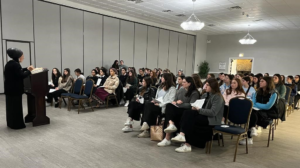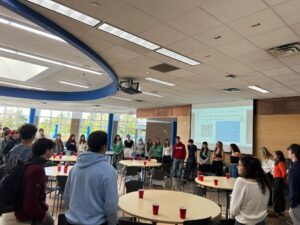 A teacher sporting a “Free Palestine” t-shirt. Muslim students calling for a walkout from class in support of Hamas. Classmates posting bomb threats on social media.
A teacher sporting a “Free Palestine” t-shirt. Muslim students calling for a walkout from class in support of Hamas. Classmates posting bomb threats on social media.
These are just some examples of the anti-Semitism thousands of Jewish teens in public schools across the region have been dealing with since the outbreak of war in Israel.
Most of these teens don’t have strong Jewish networks. They know little, if anything, about the complexities of the Israel-Palestinian conflict. And they are being fed inaccurate information – and frightening imagery – by social media.
But there is good news. Midwest NCSY runs 45 Jewish Student Union (JSU) clubs at public schools across the region. Those clubs are now seeing record attendance, with local teens searching for – and finding – connection and community in otherwise unwelcoming, and even hostile, environments.
Here’s a sampling of how our staff has been on the “front lines” across the Midwest this past week.
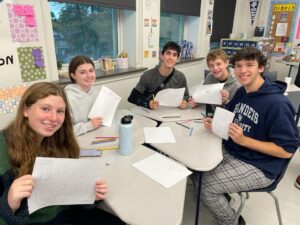 ‘Emotion’ in Chicago/North Shore
‘Emotion’ in Chicago/North Shore
“Emotional,” is how North Shore City Director Rabbi Jeremy Schaechter describes recent JSU clubs and programs he’s run at Evanston, Stevenson, Highland Park and Glenbrook South high schools.
“The teens just wanted to talk. They needed a safe space where they felt comfortable,” Jeremy says. “Many of the teens also feel alone because most of their friends are not Jewish and aren’t saying anything.”
Jeremy adds that several teens – and their parents – expressed concern about anti-Semitism, something they didn’t expect to encounter until their college years.
Max Goodman is a junior at Glenbrook South High School. “It’s been hard for all of us,” he says. “The biggest thing about Israel is that’s it’s a community, the people there, the culture, it will never be lost… I support Israel in every way.”
At his programs, Jeremy used a “head, heart, hands” formula, first sharing facts on the ground in Israel, as well as techniques for dealing with anti-Semitism. He then gave participants the opportunity to share their feelings, and finally offered them several hands-on activities they could do, such as writing letters to soldiers, to make a difference.
Naomi Golden, a senior at Glenbrook South says she struggled to find a “sense of belonging” at GBS because she began her freshman year during Covid.
“I found JSU and since then it has become like a second family to me,” says Naomi. “Especially during times like this it gives me warmth, knowing I have a strong community to lean on.”
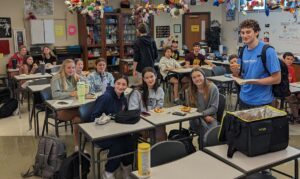 Because JSU clubs are held on public school campuses, in some instances, teens of other faiths join the clubs. And while that’s not NCSY’s primary mission, the clubs do help to build bridges between Jewish teens and their peers of others backgrounds.
Because JSU clubs are held on public school campuses, in some instances, teens of other faiths join the clubs. And while that’s not NCSY’s primary mission, the clubs do help to build bridges between Jewish teens and their peers of others backgrounds.
This past week, St. Louis JSU Advisor Chaya Manne ran a JSU club at Lafayette High School, which included teens of other faiths.
“We met together and everyone shared their thoughts and feelings,” says Chaya. “The Jewish teens shared with some of the non-Jewish teens how they can show up for them and support them, like reading more than one news article, fact checking and not posting #freePalestinerightnow.”
At neighboring Clayton High School, school officials turned to St. Louis Associate Director Sam Zitin to see what they could do to create an inclusive atmosphere at the school. Sam encouraged them to help promote his upcoming JSU club, and Dr. Dan Gutchewsky, the principal, participated.
Sam started the club with historical background to help put the current war into context for the teens, many of whom know very little about Israel. Then he opened the floor for discussion.
“[Sam] did an outstanding job presenting a lot of information in an objective way while facilitating thoughtful conversation with students under challenging circumstances,” says Dr. Gutchewsky. “It was clear that the students in the room are struggling to make sense of all that they are seeing and hearing in the media and you really helped deepen their perspective.”
Taylor Lefkowitz, JSU teen president at Lafayette, had a similar experience at her club.
“As Jewish person, [JSU] means a lot, especially in a world that doesn’t realize how badly affected Jewish people in America are [about] the Israeli conflict,” she says. “To have a safe space to voice my feelings and to also open the floor to questions in a safe space has meant so much to me and to the others in the club.”
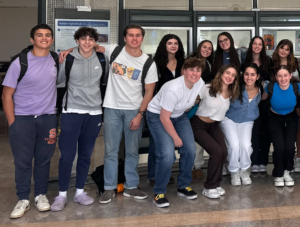 ‘Concrete Community’ in Minneapolis
‘Concrete Community’ in Minneapolis
For Ellie Weiss, a freshman at Minnetonka High School, sometimes the school day “can be really hard” – and in recent days, things have gotten harder.
“I have very few Jews in my classes,” she explains. “It feels like I’m the only one that cares about what’s happening.”
That changed last week when she went to JSU, where there was an open and honest discussion about the war in Israel.
“It was really nice to see everyone and be able to talk about it,” says Ellie. “I felt like I was a part of a community.”
Gabriela Schraber, a senior at Hopkins High School, was one of a number of Jewish teens who came to school dressed in blue and white last week. Like Ellie, she says she came to JSU to be “unified” with other Jewish teens – and she wasn’t disappointed.
“I felt comforted and heard by my other peers since a lot of us were going through the same emotions,” she says.
In general, Gabriela says she appreciates having JSU at her school because it serves as a safe space where teens can learn more about Judaism, and “express their Judaism and the Jewish version of themselves.”
And this week was no exception.
“I always felt a sense of belonging, but during this specific discussion in JSU, I felt [even] more connected to my peers,” she says.
Leo Holocomb, a senior at Southwest High School, echoes Gabriela’s and Ellie’s sentiments.
Participating in JSU this week “felt like a relief, like I had a concrete community to be a part of,” he says.
And after receiving support – and knowledge – from Minneapolis NCSY/JSU Director Mindy Daitchman and other club members, he says, “I felt a lot more confident in my ability to take on the Israel conflict.”
For her part, Mindy says it was “an intense week” that included a teen walking into a JSU club and yelling “Free Palestine,” and Jewish teens telling her that their peers told them that they and their families “deserve to die.”
“There are teens here that are really hurting inside,” she says. “At JSU we provide that safe space where they can be vulnerable and share and get the support they need.”
Perhaps Leo put it best when asked what was his biggest takeaway from JSU this week.
“Am Yisrael Chai,” he says.
The need to come to terms with the war in Israel isn’t unique, of course, to Jewish public school teens.
4G, NCSY’s girls-only division in Chicago, ran a “Tehillim B’Achdus” event last week, bringing together 65 high school girls, alumni and community members to pray for Israel. Guest Speaker Mrs. Kochava Yitzhak provided a framework for understanding the importance of Tehillim. Participants then recited Tehillim and sang “Acheinu.”
Noa Gavant, a senior at Ida Crown Jewish Academy and 4G Board Member, helped organize the event, which was attended by girls from four area high schools.
“We often get caught up in our personal environments and forget that we can connect as a whole community,” says Noa. “This event allowed me to connect to so many people and bring so much more achdus.”

